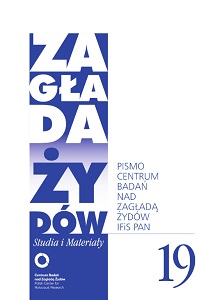Rocznice powstania w getcie warszawskim w dyskursie publicznym (ze szczególnym uwzględnieniem lat 1943–1944, 1968 i 2023)
Anniversaries of the Warsaw Ghetto Uprising in public discourse (with special reference to the years 1943–1944, 1968 and 2023)
Author(s): Jacek LeociakSubject(s): WW II and following years (1940 - 1949), Post-War period (1950 - 1989), History of the Holocaust
Published by: Stowarzyszenie Centrum Badań nad Zagładą Żydów & IFiS PAN
Keywords: anniversary of the Warsaw Ghetto Uprising; public discourse; rhetoric;
Summary/Abstract: The article presents references to the events that took place in the Warsaw Ghetto between 19 April and 16 May 1943. The source basis consists of documents, political party platforms, accounts and personal testimonies, and above all the underground press from the time of the occupation and published in Poland after 1945 (with references to Polish-language Israeli newspapers ). The author reconstructs a fragment of the public discourse on the successive anniversaries of the outbreak of the Warsaw Ghetto Uprising and the rhetorical mechanisms for its implementation. Embedded in this discourse is the project of forming a collective awareness of the uprising, Jews and the Holocaust, as well as Polish-Jewish relations during the war. Between the outbreak of the ghetto uprising to 1989 – the symbolic end of the People’s Republic of Poland – particularly noteworthy are the year 1943, when patterns of expression are formed in the heat of the moment, the years 1943–1944, late 1967, early 1968, and 1983. In this first time frame, the underground press in occupied Poland was still free. Thus, different positions and tendencies are revealed in a free and unhindered manner. In “People’s Poland”, the press market had undergone a fundamental change of character. Except for a brief period of relative pluralism (the Jewish press ceased to exist in 1949), public discourse was monopolized and the space of public communication was taken over and nationalized. Therefore, the years 1945–1948 appear particularly interesting, as other interpretations of the uprising are still published apart from the official communist one. The monopoly of public expression about the uprising was broken in 1983, with articles, reports and interviews appearing in the independent underground press. Only two periods of crucial importance for the formation of public discourse on the anniversaries of the Warsaw Ghetto Uprising are discussed in the article. Between 1943 and 1944, the basic canons for speaking and writing about the fighting in the Jewish quarter are established, and the battle for the right of the presence of the word “uprising” itself in the communication space is played out. In 1968, the discourse on commemorating the uprising was given its canonical form. The author analyzes its components – what they are: insurrection; Polish aid; rivalry for martyrdom; common fate, common struggle, and common goal. A kind of epilogue to the presented review of forms of public discourse in connection with the anniversaries of the uprising is a description of the rhetoric used eighty years after its outbreak, in 2023.
Journal: Zagłada Żydów. Studia i Materiały
- Issue Year: 2023
- Issue No: 19
- Page Range: 153-184
- Page Count: 32
- Language: Polish

